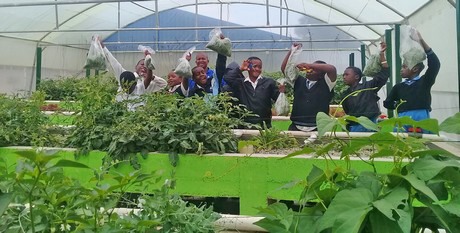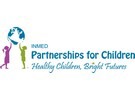As South Africa President Cyril Ramaphosa calls for schools to explore integrating aquaponics into their curricula to meet a growing demand for practical skills and food security, one school in Ekurhuleni is already proving his point.
At a special press event last Thursday at Laerskool Kempton Park, students and teachers demonstrated how they’re using their aquaponics system to not only provide year-round fresh produce and fish for the school’s meals, but also serve as an innovative teaching tool for core subjects, adaptive agriculture and environmental protection. Teachers also noted that the aquaponics system has been a particularly effective learning environment and behavior therapy tool for their students with special needs who don’t adjust well to traditional classroom settings.
Kempton Park’s aquaponics project was installed two years ago by INMED South Africa with funding from Air Products South Africa. It’s the latest of three school-based aquaponics projects with Air Products and is among nearly two dozen INMED Aquaponics projects throughout South Africa.
Aquaponics is a combination of fish farming and hydroponics in a closed symbiotic system—an ancient technique used by the Aztecs. It produces crops and fish year-round at yields significantly higher than traditional farming with no chemicals or fertilizers, while dramatically conserving water, energy and land resources. Around the world, INMED has adapted aquaponics into an innovative, affordable and simplified package for individuals with disabilities and other vulnerable populations in regions hard hit by climate change to strengthen food security, nutrition, skills development and opportunities for sustainable incomes.

INMED Aquaponics is in line with President Ramaphosa’s vision of transforming several ordinary public schools into technical high schools. Minister of Basic Education Angie Motshekga has indicated the government plans to have a technical high school in each regional school circuit over the next five years.
In addition to the aquaponics system, INMED South Africa created a sensory garden. “Because many of the students at Laerskool Kempton Park have a disability or learning challenges, we installed a special garden featuring a barefoot walking path of various textures, water and sound walls, fragrant fruit trees and vines, brightly colored plants and garden toys,” said INMED South Africa Programs Director Unathi Sihlahla.
Laerskool Kempton Park Principal Andre Page noted that teachers use the aquaponics system and the sensory garden as teaching tools and therapy for their students. “And because aquaponics is not labor intensive, the students eagerly assist with the planting and harvesting of the vegetables and herbs as well as care and feeding of the fish,” he said.
“The system exposes teachers and learners to the importance of health and nutrition and teaches them the skills to grow their own vegetables in a way that is quick, energy efficient, environmentally friendly and chemical-free,” added Sihlahla. INMED has pioneered aquaponics in South Africa to improve the nutrition and food security of children and families and develop economic opportunities in vulnerable communities for close to a decade.
Air Products South Africa Managing Director Rob Richardson highlighted that the Laerskool Kempton Park project – as well as other schools that have received funding from the company for INMED Aquaponics systems in Johannesburg – and the concept of educating learners about health and nutrition is very much in line with the company’s corporate social investment (CSI) strategy. “Air Products places emphasis on making a difference in the communities in which the company operates, and even more importantly in the current strained economy, we believe transferring skills and assisting communities to become self-sustainable has a socio-economic development advantage,” he said.
 INMED Partnerships for Children
INMED Partnerships for Children21240 Ridgetop Circle, Suite 115
Sterling, Virginia 20166
+1 571-293-9055
